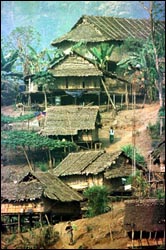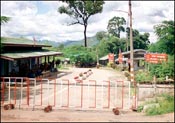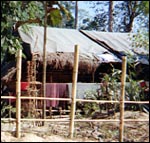 |
|
|
|||||||||||||||||||
 | |||||||||||||||||||
All the recent controversy about globalization and the World Trade Organization spotlighted growing concern that U.S. corporations need to take more responsibility for how workers are treated in factories overseas. All heard about the flap over issues like wages and workplace safety in Nike shoe factories in Asia and Kathy Lee Gifford's clothing factories in Central America. But now here's a landmark legal case that goes way beyond that; human rights groups have sued the Unocal corporation. You used to know it as Union Oil of California. They charge that since the early 1990s, Unocal has joined hands with dictators in Myanmar to turn thousands of citizens there into virtual slaves. It's a landmark case, not just because human rights groups charge that UNOCAL has engaged in slavery. This is the first time that anybody has sued an American corporation in an American court on the grounds that the company's violating human rights in another country. National Public Radio's Daniel Zwerdling traveled to the region and has this report. YOU'LL FIND SOME OF THE KEY EVIDENCE in this case in a refugee camp which straddles the border between Mynamar and Thailand. Hundreds of thousands of people have escaped from Mynanmar in recent years and now some are living in a sea of shacks, all jammed together in a ravine. Relief workers drive into the camp one morning in a pickup to hand out rice and blankets. They pass the time listening to Thai rap. Relief Worker: There are totally, nearly ten thousand population living in this camp. These refugees have abandoned their homes in Myanmar for all kinds of reasons. Some were backing the movement for democracy. They saw Myanmar's army torture dissidents and kill protesters in the streets. Others were caught in the crossfire between the government army and rebel groups. And the relief worker figures that more than a thousand of the refugees, in just this one camp alone, have come here to escape the slave gangs. Call this man Neerohd. The refugees say it's too dangerous to use their real names. The way he tells his story, he used to raise cashew trees and betel nuts on a small farm, up in Myanmar's hills. But then one day, a battalion of government soldiers rolled into his village. And the soldiers rounded up dozens of men and basically said, "you're coming to work for us, now folks, you'll have to leave your families and farms behind." And the soldiers hauled the men off to the jungle and forced them to chop it down — at gun point. Neerohd speaks through an interpreter. Translator: It's like that. He is pointing to that bamboo and bushes there. If you'd visited Myanmar back then, back in the early 1990s, you might've heard government officials boasting about their big pipeline project. The military rulers announced they were joining hands with two famous foreign companies - - the French firm called Total, and Unocal from the United States. They were building a pipeline that would pump natural gas from way out at sea all the way up on land. This project would take thousands of workers. And Neerohd says he and the other men from his village were forced to work on the project — for free. In fact, he says the soldiers were so worried that the villagers might try to escape, that the soldiers locked them up at night, inside stockades, and tied each man's wrist to the man next to him. Neerohd: talking in Burmese. Neerohd says he finally did manage to escape, he walked through the jungle and over the mountains to this refugee camp. And now he's at the center of that extraordinary lawsuit against Unocal. Lawyers in the case estimate that Myanmar's army turned as many as ten thousand villagers into slaves to work on the pipeline project. But sagas like Neerohd's suggest that poor people from a little-known country can take on a multinational giant and make legal history. This story really begins, in a way, on the other side of the ocean in a bland office building near Los Angeles. This is Unocal headquarters. There are palm trees in the atrium and fountains. Unocal has its own private elevator. It won't move until the invisible receptionist beams you up. When you read Unocal's literature, they describe themselves as the largest independent energy company in the world. And the way John Imle describes Unocal, it's one of the more public-spirited companies in the world. Imle's winding up his term as vice chairman of the company. He'll tell you right off what he thinks of those stories about the pipeline. Imle: I don't believe those charges. I wouldn't call them lies. Maybe confusion about what has been going on where. I mean, I have heard stories that…I just don't believe those stories. Imle says when he and fellow executives decided to get into the pipeline project with Myanmar's government, their first goal was to make a profit after all, he says, they're a business. Imle: But right behind that and as a condition, always a condition of that investment, we'll only invest in places where we can improve the lives of people. And Imle says the gas pipeline will improve lives across the region. The project is pumping gas across Myanmar to a power plant inside Thailand. It'll help bring electricity to people who still cook with firewood and light up their homes with kerosene lanterns. Still, Imle says, he and his colleagues realized that they'd cause some controversy when they formed a partnership with the military rulers in Myanmar. They knew that everybody from US Presidents to human rights groups to United Nations officials; all these people have repeatedly denounced Myanmar's dictators as some of the most brutal on the planet. And Imle says he realized that Myanmar's government is infamous for using what some people call "forced labor" or conscripted labor. According to widespread evidence, the military routinely rounds up citizens and forces them to build projects from bridges to railroads. Imle: I accept that conscripted labor is used broadly in civil projects in that country, in Myanmar. But Imle says he was determined to make their pipeline project a model of the ethical way to do business — maybe they'd even nudge the dictators toward democracy. And now we get to one of the key issues in this entire case. The way Imle describes it, Myanmar's army would patrol the pipeline route and provide security — that's it. He says company executives wouldn't tolerate it, if the military forced villagers to work on the project against their will. Imle: We worked very hard, and Total as well, to determine that we would be able to conduct our business in an absolutely ethical, honest and moral manner. That's Unocal's public version of events. Other Unocal sources paint a different picture. They suggest that from the very beginning of this project, Unocal and Myanmar's military had a close relationship. For instance, National Public Radio has obtained an internal State Department cable, and it describes a private meeting a few years ago between American diplomats and Unocal's representative in Myanmar. According to this cable, Unocal's point man told the diplomats that Unocal and Total had actually hired Myanmar's military to work for the companies.
That's the voice of a Unocal lawyer. He was monitoring the interview from another room. And consider this: according to company sources, Unocal hired a former Pentagon analyst to investigate whether the army was abusing human rights along their pipeline. And he warned Unocal executives that Myanmar's military was committing "egregious human rights" violations. According to company sources, the consultant flatly told executives that when they keep insisting that slave labor is not being used to support the project, they appear "at best naïve and at worst a willing partner in the situation."
I wanted to visit the pipeline to see the situation firsthand. But the government of Myanmar blocked the way. When I told them I was reporting on the pipeline project, they refused to give me a visa to enter the country. And so I traveled to the border between Myanmar and Thailand to meet with refugees near this lake. It's a spectacular lake. It's flanked by jagged mountains, like worn shark's teeth, and the boatman points out Buddhist temples along the banks. One of the first refugees I meet says he used to be a soldier in Myanmar's army and he contradicts just about everything that John Imle says. Call this man Cho. As we talk, we're sitting in a small hotel room, which looks out over the water. Cho says he enlisted in Myanmar's army when he was 18 years old. And he made good money. But Cho says he deserted the army a couple years ago, because he couldn't stand the way that they were virtually kidnapping villagers, and forcing them to work on Unocal and Total's pipeline project: Translator: We went by army truck and then when we got to a village, we see men that we would find on the road and then we brought them back to the truck and make them work for us. Over the next few days, more refugees tell their stories, along the shores of this beautiful lake. They're too skinny, some have rotten teeth. And the more they talk about the pipeline project, the more it sounds like Bible tales about the slaves in ancient Egypt. The way they describe it, there were two kinds of workers along the pipeline. One group was lucky — they got real jobs, they dug the ditches and put in the pipes and Total and Unocal paid them high wages. But then there was a vast second group of workers, like these refugees, they generally got the area ready so the paid construction crews could move in. They say the soldiers made them haul rocks and build dirt roads, they had to carry the army's supplies. And they say the soldiers punished them for the slightest problem. This man says he reached his breaking point just last summer. He says the soldiers who work on Unocal and Total's pipeline project were forcing him to haul their food and ammunition. When he told them he needed time off because he was sick, they tortured him. The local relief worker translates. Translator: They beat him and they put some water in his nose and they immersed him in water. And they put water in a jar and they put it in his nose for several minutes.
Most of the refugees who say they escaped from the labor gangs used to be poor farmers. And the rest of the world might have never heard their stories and Unocal wouldn't be in court if they'd been left to their own devices. But a couple of prominent activists from Myanmar seized on their case, as a way to pressure the country's dictators. One of them is named Maung Maung. Maung Maung: We have noticed that in American there is justice. Maung Maung's sipping tea at an outdoor restaurant near the refugee camps along the Thai-Myanmar border. He used to work for Myanmar's government, in their mining department. Then he got in trouble when he tried to organize a union of government employees and that's why he had to flee. But Maung Maung says he really got angry when he heard other refugees talking about the pipeline and he says the more he thought about it, the more he wanted to force Unocal and Total to take responsibility for spreading misery. He'd read in the newspapers how ordinary people in America can have their day in court. Maung Maung: A lady who was going between two tall skyscrapers was caught in a very strong wind. She fell and she sued the buildings…the building owners and she got compensation. There was this people, person, who shot another man's dog on the other side of the fence and he had to give compensating. Like I explained before, you can speak out and if you have grounds, then you are listened to. Maung Maung and other activists from Myanmar started telling the refugees' stories to human rights groups. And soon, American activists were organizing protests like this one outside Unocal headquarters in California. And they convinced more than 20 city councils across the country, along with the state of Massachusetts, to pass laws banning contracts with Unocal that do business in Myanmar. The Massachusetts law was overturned a few months ago, and the case is heading for the Supreme Court. And meanwhile, the activists from Myanmar started thinking, maybe they could put Unocal and Total on trial. That was a long shot, because people have always had to sue a company in the country where the company is allegedly breaking the law and in the pipeline case, that would be Myanmar. But lawyers at human rights groups based in this country found a strategy in a law passed in 1789, that's back when George Washington was President and pirates plundered ships at sea. The law's called the Alien Tort Claims Act. It said in effect that if anybody, violated your human rights anywhere in the world, you could sue them here in America, if you could find them on American soil. Paul Hoffman is one of the attorneys on this case. He teaches civil rights law at various universities. Paul Hoffman: If you were say, a British person. Someone who had a ship in the shipping lanes from Britain to the united states in the eighteenth century or early nineteenth century and you were subjected to piracy ion the high seas whether by an American or by anyone else and you could find that person within the United States, you would be able to bring a civil action against them. The law was pretty much forgotten until the 1980s. But then, Hoffman and other lawyers dusted it off to use against modern political pirates. They sued despots like Ferdinand Marcos, the deposed president of the Philippines. The moment he stepped foot on American soil, the lawyers charged him with committing murder and torture in his own country. So when these lawyers heard about the pipeline, they sued Unocal. And it's a landmark case. It's the first time that a judge has allowed people to sue an American corporation in an American courtroom on the grounds that the company is trampling human rights in another country. Lucian Dhooge's been watching industry executives react to the Unocal case — he teaches business law at the University of the Pacific. Lucian: I think this case is potentially very important to multi-national corporations. It certainly sends the message that when you do business with a thuggish regime you need to be careful or cognizant that there are consequences that flow from that. And Dhooge argues that the case against Unocal sets a dangerous precedent. Specifically, the refugees are charging, through their lawyers, that Unocal has broken international treaties that prohibit slavery. The plaintiffs can't sue Total, because the company doesn't operate much on American soil. Dhooge echoes what other people are saying in the business world, he says no matter how much you might want to punish Unocal if it really did what the refugees claim, an American courtroom is the wrong place to do it. Dhooge: I have some very serious concerns here because this opinion is the first case that says that American companies have an obligation to conform their conduct to human rights treaties. Before, treaty obligations were between states. Now we have a court telling us that in certain instances that these treaty obligations will apply to private transactions. Ultimately, I do think that Unocal or any other company that engages or participates in forced labor abroad should be held accountable for that. However, I think there is a concern here that the court crosses into the political realm, the foreign relations realm, and that area clearly belongs to the President and the Congress. The case against Unocal has already made history, that happened when the judge ruled that people can sue a company for violating human rights overseas. Now the judge has to decide if there's actually enough evidence against Unocal to force the company to stand trial. If the case does go to trial, refugees from Myanmar could theoretically win millions of dollars in damages. And the trial would be one of the more unusual spectacles in legal history. The plaintiffs are planning to take the stand. You'd see poor farmers and fishermen from the nation of Myanmar sitting in a Los Angeles courtroom. They'd tell stories like this man told me, back at the lake near the refugee camp. He says they were working on the pipeline project as it climbs into the mountains and a villager named Usantee got in trouble. Translator: Usantee was already old and very tired. As he couldn't carry his load as well as us, he couldn't follow us. The soldiers beat him because he was, they thought that he was putting up a sham, and that he was pretending to be tired. And then John Imle would probably take the stand, for Unocal. And if Imle tells the court what other company officials told me in background, he'll suggest that radical activists are goading the refugees to make up lies to discredit Myanmar's rulers. In fact, Imle says, it's too bad that the government of Myanmar refused to let me see the pipeline, because the companies haven't just laid a bunch of pipe. He says they've launched social development projects in the villages around it. He went to visit. John Imle: What I saw taking place there was the construction of clinics. The injection of nineteen doctors into an area that used to have none. I see now infant mortality rates that are one-half the national average because the medical facilities we provided. I see the children in school at double the national rate because of educational facilities and larger classrooms that we provided. The federal judge will probably rule in the next two months whether Unocal has to stand trial.
Recent BBC news on Burma Burma Project CIA Burma web site Unocal's page about the
Myanmar gas project Unoal's response to
this news report Burmafund's Unocal website Total's Myanmar website | |||||||||||||||||||


